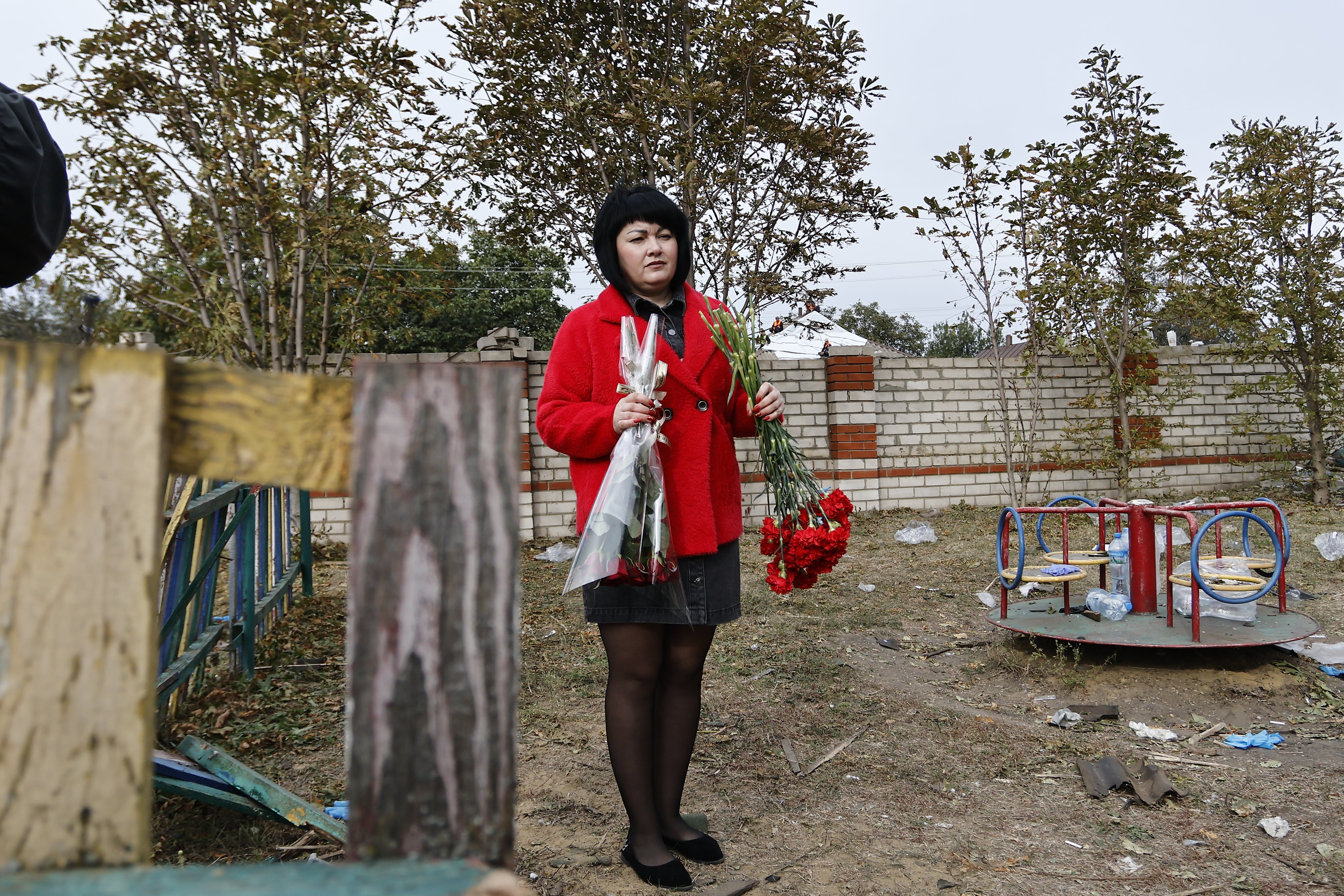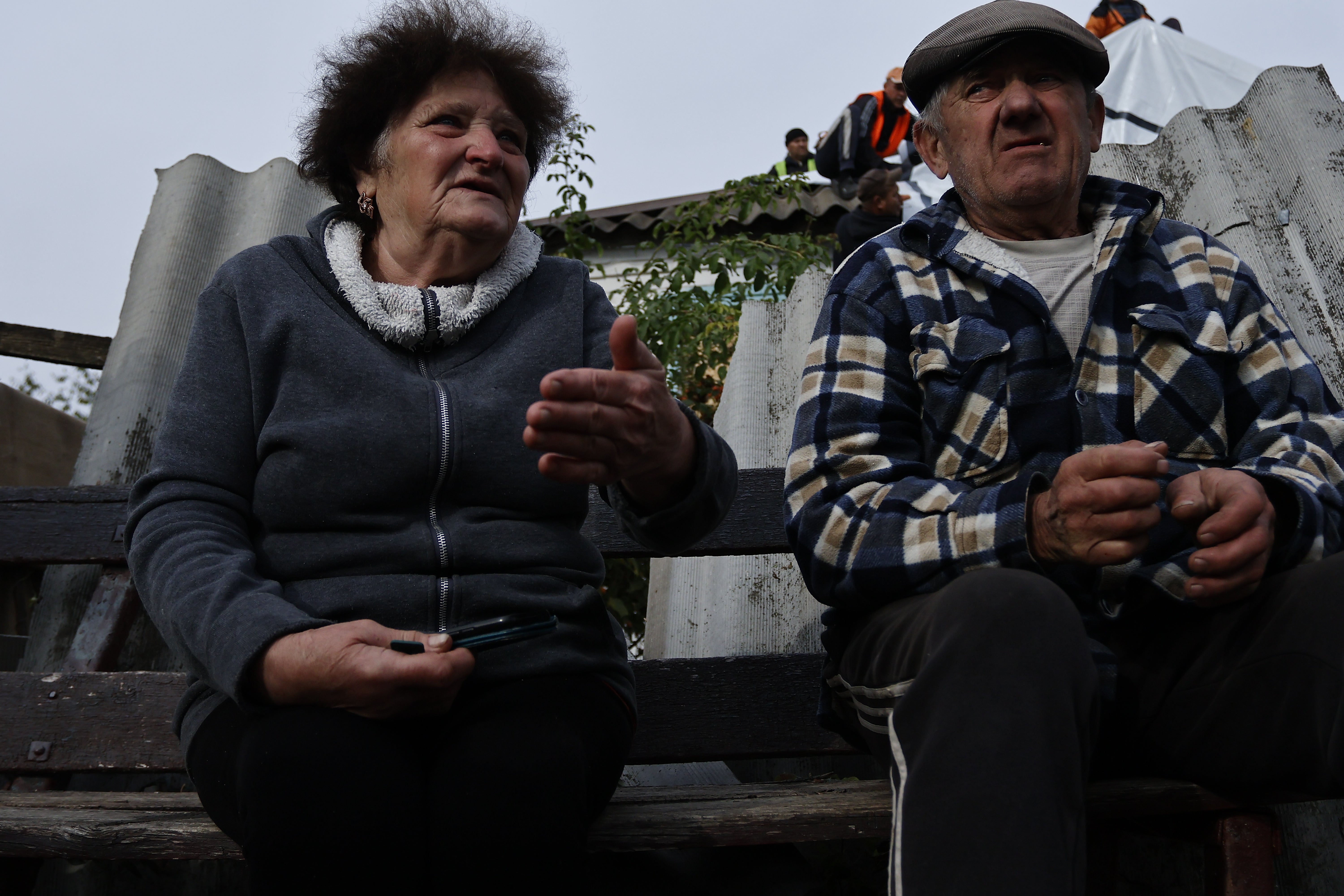‘You can still smell the blood’: Inside the village where more than 50 were killed by a Russian missile
A sixth of the residents of Hroza, in the northeastern Kharkiv region, are dead. Maira Butt speaks to some of those who now have to deal with the pain and grief

Your support helps us to tell the story
From reproductive rights to climate change to Big Tech, The Independent is on the ground when the story is developing. Whether it's investigating the financials of Elon Musk's pro-Trump PAC or producing our latest documentary, 'The A Word', which shines a light on the American women fighting for reproductive rights, we know how important it is to parse out the facts from the messaging.
At such a critical moment in US history, we need reporters on the ground. Your donation allows us to keep sending journalists to speak to both sides of the story.
The Independent is trusted by Americans across the entire political spectrum. And unlike many other quality news outlets, we choose not to lock Americans out of our reporting and analysis with paywalls. We believe quality journalism should be available to everyone, paid for by those who can afford it.
Your support makes all the difference.Many woke up dazed in the Ukraine’s Hroza on Friday – with the village in the northeast of the country having lost a sixth of its residents in the devastation caused by a Russian missile strike the previous day.
Ihor Klymenko, minister of internal affairs of Ukraine, said the village only had 330 residents – and that at least 52 had been killed in the assault. He added that every family had at least one person they knew at the wake for Ukrainian soldier Andrii Kozyr inside the cafe (and grocery shop) that was wrecked by the missile. That wake followed a funeral that had been an attempt to rebury a father who had been killed in Russian-occupied territory last year. Now candles mark the spot where the lives of those mourners were lost.
Residents have said that the cafe, Hrozivske, had been closed for much of the time since Russia’s invasion began in February last year, and that the wake had marked one of the first major events of its reopening. The strike that followed is one of the deadliest of the war.
Alina, 23 – who only wanted to be known by her first name – moved to the village after marrying a local three years ago. Alina says she and her husband were due to be at the memorial, but their car engine faltered and they couldn’t make it in time. “We were meant to be there. We were meant to be dead,” she says.
Now all she feels is anger at the missile strike. “They were just normal people living a normal life,” she says of those who died. “Most of them were farmers, working with wheat and barley.”
The village, in the Kharkiv region, was founded in 1922, and its name translates as “thunderstorm”. It was first occupied by Russian forces in February 2022 and was liberated by Ukrainian forces that September. Alina says that when the village was occupied by Moscow’s forces, mostly older people stayed behind as the younger residents fled. When the village was due to celebrate its centennial anniversary last year, she says that residents spent the time hiding in their cellars.
“We felt enormous joy when Russian forces left,” she continues. “It was great to be Ukraine again. [Now] I have no words for what’s happened.”

Hroza had 501 inhabitants before the invasion according to local journalist Iryna Antoniuk, who is a correspondent with the My-Ukraina (We Are Ukraine) TV Channel. She says that half of the 300 or so who remained in the village had been in attendance at the wake.
In a morning visit to the village, less than 24 hours after the attack, Ms Antoniuk says “you can still smell the blood” among the wreckage. “It’s a tiny little village. This building that was hit, was in the very centre, so it’s so noticeable. Immediately, when you enter the village, you notice it. People have started bringing flowers now to pay tribute.”
Workers at the local cemetery cut down trees and mowed grass to prepare graves for those killed. They are to be buried not far from the soldier Kozyr, whose wake they were attending. Residents also gathered to mourn in groups in the village centre, which was largely deserted except for people picking up humanitarian aid, including materials to repair their damaged houses.
Dr Robert Dale, senior lecturer of Russian History at Newcastle University, says: “Hroza... has seen much bombardment during the Russian offensive.

“This is a location that as a borderland area has long been a site of conflict, and at the sharp end of wars. The Kharkiv region suffered very badly in the ‘Russian’ civil war, the Holodomor, and the area changed hands repeatedly in the Second World War... perhaps one reason for why Hroza seems to have so little recorded history is that these rural regions have been ravaged throughout the 20th century.”
He added: “The Kharkiv region’s proximity to the Russian border means that it has borne much of the brunt of this conflict.”
The Hroza victims made up most of the 54 civilians killed in the country over the previous 24 hours, Ukraine’s presidential office said on Friday. The UN human rights chief, Volker Turk, said he was “shocked and saddened” by the attack.
On Friday morning, Ukrainian officials said another two Russian missiles had killed a 10-year-old boy and his grandmother in the city of Kharkiv.
Emergency crews pulled the boy’s body from the rubble of a building. He was wearing pyjamas with a Spider Man design. The strike also killed the boy’s grandmother and wounded an 11-month-old child, the interior minister Mr Klymenko said. The regional governor, Oleh Syniehubov, said that in all, 30 people were wounded. Rescue operations are continuing.
Officials said preliminary information indicated that the Kremlin’s forces used two Iskander missiles in the attack, the same as in the strike on Hroza.
The attack may have only lasted seconds, but Alina says she will feel the hurt for a long time. “I knew every single person that has died. They were our buddies, our friends, our family and neighbours,” she says.



Join our commenting forum
Join thought-provoking conversations, follow other Independent readers and see their replies
Comments